Your cart is currently empty!
Category: General
-
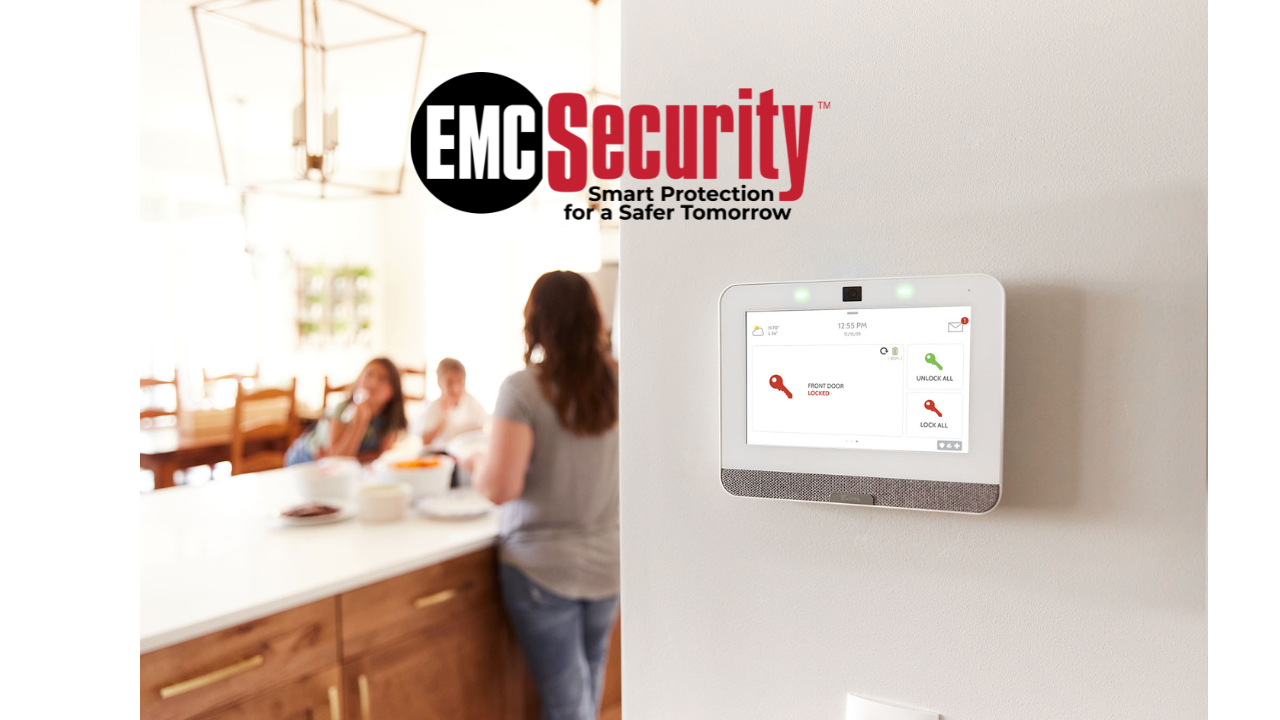
Elevate your Home Security with the IQ 4 Panel
As a homeowner, you deserve to know that your home and family are always safe. Designing a comprehensive security solution will give you unprecedented knowledge and control over your home in Georgia. However, in today’s rapidly growing technology landscape, the number of devices available can feel overwhelming. With so many things to account for, how can you be sure you’re starting in the right place? You start with IQ 4 Panel.
Powerful home security starts at the security panel, and IQ 4 Panel by Qolsys brings a perfect blend of brains and brawn to seamlessly orchestrate your entire security system. IQ 4 Panel features cutting-edge security features designed to provide an advanced home security solution for homes of all sizes.
Visual Insight into Your Home:
The IQ Panel boasts an impressive 8-megapixel camera that offers real-time insight into the goings-on around your home. With the ability to capture disarm photos and alarm videos, you can easily check in on family members or review suspicious events and always remain aware.
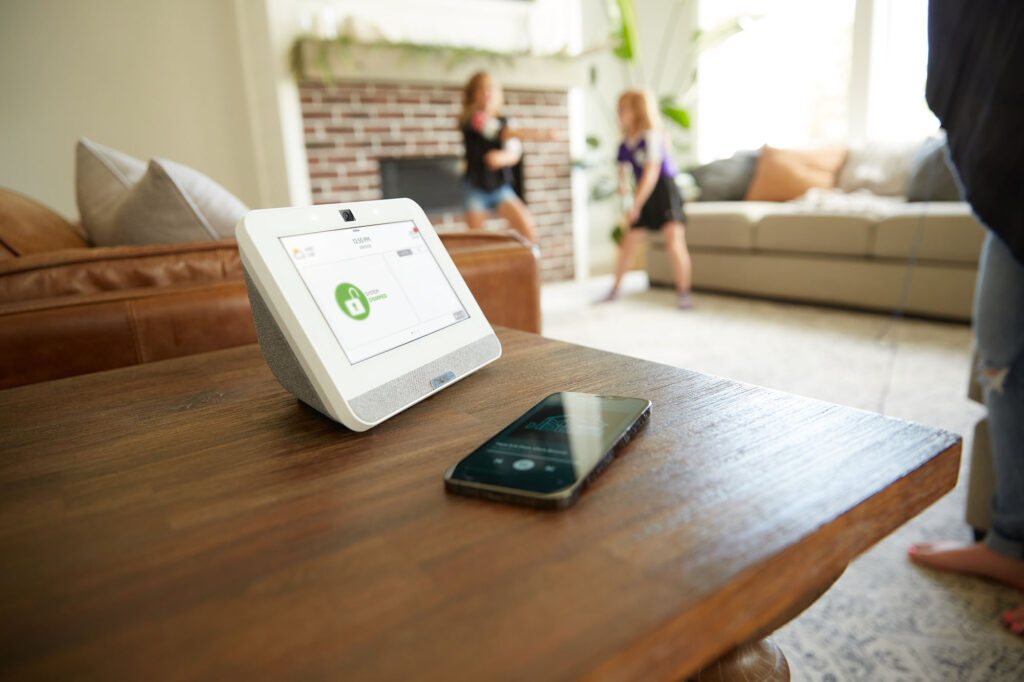
Unmissable Audio Alerts
The IQ Panel 4 features four four-watt speakers to ensure that each alarm is heard loud and clear throughout your entire household, whether you’re dealing with a break-in or a fire. With these speakers, you can rest assured knowing that potential hazards to your family’s safety will be promptly addressed.
LTE and Wi-Fi Dual Path:
Maintaining a strong connection from security devices to the central monitoring station is crucial. The IQ Panel offers dual path connectivity through LTE and Wi-Fi to ensure you are always connected to the central station even in the face of potential disruptions. In the event of a life-threatening emergency, you can have peace of mind knowing that the panel can communicate with the central station, facilitating swift and efficient response.
Your Gateway to Advanced Security
The IQ 4 Panel is the best choice of security panel for homeowners seeking state-of-the-art protection for their families. IQ Panel also comes with a host of other features to make your life easier, like PowerG wireless technology and automation features.
An investment in IQ 4 Panel is an investment in the safety and security of your home and family. Upgrade your home protection today and enjoy the benefits of advanced security and smart home control in one sleek device.
EMC Security is your local dealer in the Atlanta area offering the IQ 4 Panel. >>CLICK HERE<<
-
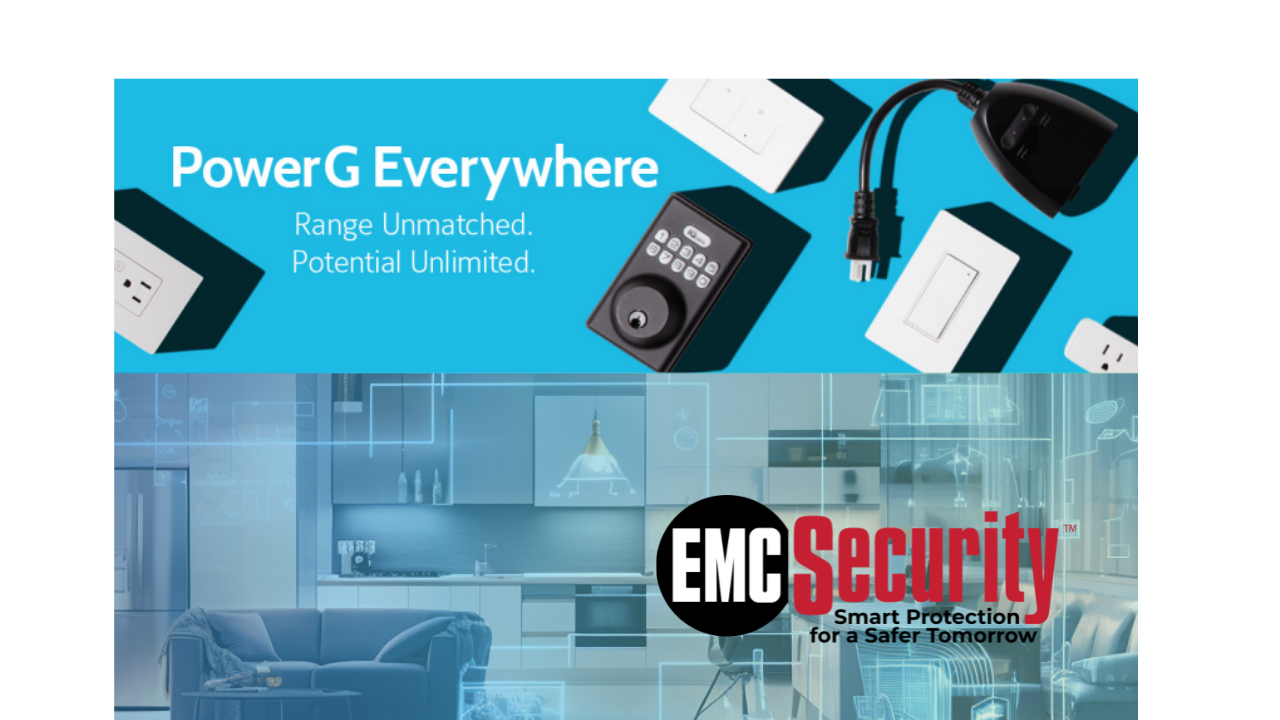
PowerG: Ultimate Wireless Security
Strengthen your home or business’s security with industry-leading range and reliability,
EMC Security is now offering PowerG Sensors in Georgia and South Carolina. This is a groundbreaking wireless technology employed in our security sensors and devices. This wireless protocol significantly enhances security with impressive range, reliability, and encryption for homes or businesses.
How can PowerG do?
PowerG’s mile-plus range ensures flawless sensor operation, providing system confidence and peace of mind. With PowerG, you can trust that your devices will communicate properly, even on large properties or challenging environments. Whether you have a warehouse in Metro Atlanta or a large estate in Greenville, this is your go-to solution.
It also also comes with powerful two-way encryption to defend your system against electronic attacks. Legacy security protocols’ repeated transmissions make them vulnerable to electronic attacks like replay attacks, easily disrupting your security. Replay attacks involve using devices to retransmit previously recorded security system events. Two-way encryption in these sensors stops these attacks, ensuring your security.
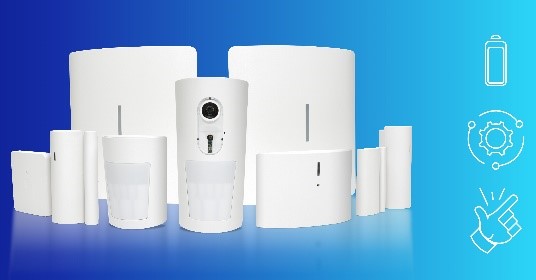
With PowerG, you can also easily integrate other PowerG-enabled devices seamlessly with your existing surveillance cameras and home security systems. It’s wide range of security products allows for quick expansion and customization of any size security network. Its user-friendly interface simplifies system maintenance with streamlined arming, disarming, monitoring, and alerts.
By designing your perfect security system around PowerG, you are investing in the best wireless security technology available. With advanced features, unmatched reliability, and robust security, this ensures that your home or business remains secure at all times. Don’t compromise on your security – choose PowerG for ultimate peace of mind. Contact us today to learn more about how this technology can transform your security system. >>CLICK HERE<< to schedule a call with a knowledgeable product expert!
https://www.johnsoncontrols.com/security/intrusion-detection/powerg-wireless-technology
-

What are the Most Dangerous Cities in South Carolina?



From historic Charleston to the sun-soaked beaches of Myrtle Beach, South Carolina is known for its southern hospitality, scenic coastlines, and rich cultural history. But beneath the Palmetto State’s inviting charm lies a harsher truth—its crime rates, both violent and property-related, are climbing higher than the national average. This unsettling trend has led many residents to take a closer look at their personal safety and explore stronger protection measures.
As concern grows, so does the demand for reliable South Carolina home security. That’s where EMC Security comes in. With deep roots in Georgia and trusted experience throughout the Southeast, EMC Security is helping families across South Carolina feel safe in a time when knowing the most dangerous cities in South Carolina is more than just trivia—it’s essential awareness. Keep reading to find out which cities top the list in 2025, and how you can take action to keep your home and loved ones secure.
5 of South Carolina’s Most Dangerous Cities in 2025
- Spartanburg
- Anderson
- Greenville
- Laurens
- Union
Does South Carolina Have Lots of Crime?
South Carolina is known for its charm. But crime in many areas is making some residents feel uneasy. The facts support those fears. Both violent and property crime rates are above the national average. That’s why people are taking a closer look at South Carolina home security.
Crime Statistics in South Carolina
Let’s break it down with the latest available data:
Type of Crime South Carolina Rate (per 1,000) National Rate (per 1,000) Violent Crime 5.5 4.0 Property Crime 23.9 20.7 What This Means for Residents
- Some areas have far higher rates than others.
- In growing towns, theft and break-ins are more common.
- Many people feel crime is getting worse—even when data stays flat.
- News coverage and social media often heighten this fear.
This mix of perception and reality is leading more homeowners to act. Many now seek clear, simple ways to protect their space.
Why Localized Data Matters
Not all cities are equal when it comes to crime. A safe street in one town may be blocks from a high-risk zone. That’s why personalized protection is so important. EMC Security builds systems based on where you live and what you need.
Most Dangerous Cities in SC
The Upstate region of South Carolina blends Southern charm with modern growth. But with rapid change comes rising risk. Several cities in this area are now among the most dangerous cities in South Carolina, prompting many families to rethink how they protect their homes.
Below is a closer look at crime in key Upstate cities—and how smart tools like security cameras and alarm systems can make a difference.
Spartanburg
Crime Rate: 81.85 per 1,000 people
Main Concerns: Theft and burglary are high, and growth is outpacing law enforcement staffing.
Community Response: Local programs aim to improve lighting, patrols, and youth outreach.
Security Tips:
- Install home alarm systems for early alerts.
- Add video doorbells to see who’s outside, even when you’re not home.
- EMC Security offers mobile access and fast alerts for added peace of mind.
Anderson
Main Concerns: Property crime remains high. Drug activity is a growing concern in some areas.
Community Response: Neighborhood watch groups and improved lighting have helped.
Security Tips:
- A fire alarm system is key for both homes and apartment units.
- Smart locks can reduce risk and help you track who comes and goes.
- EMC’s smart systems let you manage it all from one app.
- Great for families who want more control without the hassle.
Greenville
Main Concerns: As the city grows, crime rates rise—especially break-ins and car theft.
Community Response: Police have increased patrols and public safety talks.
Security Tips:
- Buy security cameras to watch your home day and night.
- EMC’s cameras offer night vision, cloud storage, and mobile access.
- Add smart plugs and lights to create the look of someone always home.
- Greenville SC homeowners are investing in South Carolina home security more than ever before.
Laurens
Main Concerns: Though small, the city has a high crime rate for its size.
Community Response: Local police work hard but face limited resources.
Security Tips:
- EMC’s color touchscreen keypad offers simple control.
- Tamper alerts and Alexa voice features bring peace of mind.
- Ideal for families wanting a DIY install or help from pros.
Union, SC
While not a main Upstate focus, Union, SC deserves a mention:
Crime Rate: 92.45 per 1,000 people—the highest in the state.
Why It Matters: Even smaller towns face real threats.
Security Tips:
- EMC can scale systems from small homes to full campuses.
- A custom home security plan makes sense no matter your ZIP code.
Upstate South Carolina is growing fast. But so are safety concerns. Knowing which areas top the list of the most dangerous cities in South Carolina is the first step. Taking action with smart, easy-to-use security cameras, alarms, and automation from EMC Security is the next.
You don’t have to wait for something to go wrong. EMC is here to help you stay ahead.
What Makes These Cities So Dangerous?
Some cities in South Carolina face more than their share of risk. But it’s not just about crime. Many deeper issues make these places harder to keep safe.
Why Crime Stays High in Some Areas
Several factors feed into the numbers. These issues are hard to fix and often build on each other over time:
- Poverty and job loss
Less income often means more crime and fewer safety resources. - Lack of strong policing
Some towns can’t fund full patrols or community programs. - Outdated safety tools
Many homes and businesses don’t have modern alarms or cameras. - Fast population growth
More people can stretch a town’s safety systems too thin.
Pro Tips to Protect Yourself in SC’s Riskiest Areas
Living in a high-risk area doesn’t mean you have to live in fear. A few smart steps can help you feel more in control. These tools and habits make it harder for crime to reach your door—and easier for you to rest easy.
Top Safety Tips for South Carolina Homes
These safety ideas are simple. But they work. And most of them take less than a day to put in place:
- Install home alarm systems that alert you and the authorities in real time
- Add motion sensor lights to catch unwanted guests before they get too close
- Use IR night vision cameras to spot trouble in the dark
- Buy security cameras with cloud video storage so you never lose footage
- Set up video doorbells to monitor visitors or package drop-offs
- Upgrade to smart locks to keep entry points tight and secure
- Install a fire alarm system that also detects carbon monoxide
The Power of Prevention
One of the best ways to stay safe is to make your home a hard target. People who break into homes don’t like visible cameras or loud alarms. Even simple signs can stop a break-in before it starts.
When security is easy to see, most criminals move on.
EMC Security Makes It Easy
EMC Security gives South Carolina families the tools they need—without the hassle. No long-term contracts. No wires to run through your walls. Just smart, simple tools that work:
- Wireless alarm systems with mobile access
- Professional-grade video gear that’s easy to install
- 24/7 monitoring from a trusted name in the Southeast
From small homes to large ones, EMC builds custom setups that fit your needs. Whether you rent or own, these tools help protect what matters most.
A Powerful Partnership Strengthening Security Across South Carolina
In a state where safety is top of mind—especially in areas with higher crime rates—the partnership between EMC Security and ProTec, in collaboration with Laurens Electric, is bringing a much-needed boost to home and business security across South Carolina.
EMC Security, well-known in Georgia for its flexible, no-contract approach and comprehensive service offerings, has teamed up with ProTec to extend its trusted solutions into the Palmetto State. This partnership, backed by the local support of Laurens Electric, means customers in South Carolina now have access to advanced security technologies—like AI-powered video surveillance, smart home integration, and medical alert systems—delivered with local, in-person service from offices in Greenville.
Together, these companies are enhancing response times, expanding commercial-grade security options, and simplifying the customer experience with benefits like 0% interest financing and utility-bill integration. Whether you’re protecting your home or business, this collaboration offers South Carolina residents a powerful combination of cutting-edge tools and hometown support—all without locking you into long-term contracts.
Is Greenville, South Carolina a dangerous city?
Greenville, South Carolina has a higher-than-average crime rate, especially for property crimes like theft and burglary.
Is Spartanburg, South Carolina a dangerous city?
Spartanburg is considered one of the more dangerous cities in South Carolina, with a crime rate of 81.85 per 1,000 residents.
Is Anderson, South Carolina a dangerous city?
Anderson has moderately high crime, with property crime and drug-related activity common in several neighborhoods.
Is Laurens, South Carolina a dangerous city?
Laurens has a small population but a high per capita crime rate, making it one of the riskier towns in the Upstate area.
Is Clemson, South Carolina a dangerous city?
Clemson has a lower crime rate compared to other cities in the Upstate. It is not considered a particularly dangerous city.
Peace of Mind Starts with EMC Security
When safety is a top concern, having the right tools can make all the difference. If you live in Greenville, Spartanburg, Anderson, or Laurens, EMC Security is here to help you take control of your home’s protection.
We offer a full range of services:
- Home safety: fire and CO alerts, video doorbells, and smart locks
- Surveillance: indoor and outdoor security cameras with live and recorded views
- Monitoring: 24/7 support and emergency response when you need it most
- Custom fit: DIY or pro install, no contracts, and free quotes
We serve homes and businesses across Georgia and support nearby South Carolina families who want simple, strong protection. Whether you’re ready to buy security cameras, install home alarms, or build a full fire alarm system, our team can help create a system that fits your space and your life.
Want to know how each piece of a system works? Take a look at the security system parts that keep your home covered. Locked into a long deal? Learn how to spot a bad contract before it’s too late. And don’t miss our checklist of spring safety tips to keep your home ready year-round.
Protect your home and loved ones—whether you live in Greenville, Spartanburg, Anderson, or Laurens.
Contact EMC Security today to build a custom security solution that fits your life and your budget.
-
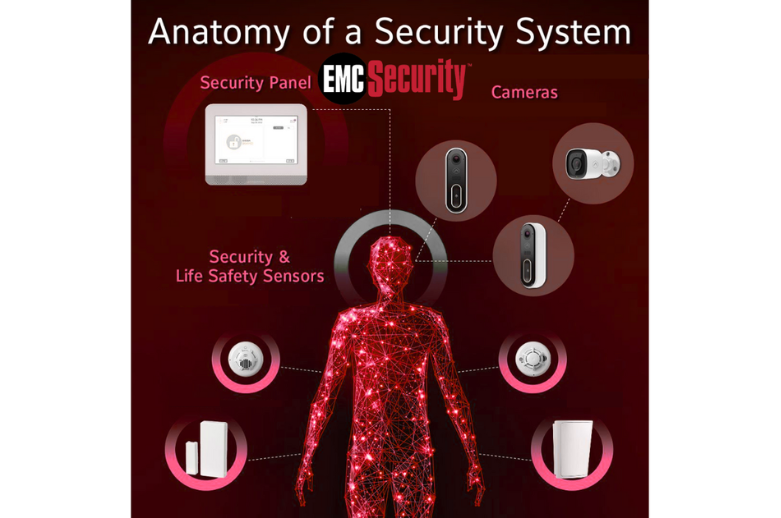
Anatomy of a Security System with IQ4
Protecting Your Sanctuary: Building a Home Security System That Works for You
Imagine the peace of mind knowing your home and loved ones are safeguarded. Just like your own body relies on a network of interconnected systems to stay healthy, a robust home security system depends on intelligent components working seamlessly together to protect your sanctuary. Feeling overwhelmed by the options? Think of your security system as a dedicated guardian with different parts playing crucial roles. Look no further than the IQ4 System.
The IQ4 Security Panel: Your System’s Intelligent Brain
At the heart of it all is the security panel – the brain orchestrating your entire security network. A smart panel, like the IQ4, doesn’t just receive alerts; it acts swiftly, ensuring your home’s safety by communicating directly with a central station to promptly notify authorities when an alarm is triggered. This immediate response is critical in an emergency.
Your Eyes and Ears: Cameras and Sensors Working in Harmony
Comprehensive protection means having both the “eyes” to see and the “touch” to sense.
- Cameras (Indoor, Outdoor, & Video Doorbell): These are your visual watchtowers, providing real-time monitoring of your property, whether you’re home or away. A video doorbell adds an extra layer of security, allowing you to see and speak to whoever is at your door without opening it, deterring potential threats and providing valuable evidence if needed.
- The Power of Sensors: Think of sensors as the nervous system of your home.
- The PowerG door/window sensor acts as an early warning system, instantly detecting unauthorized entry attempts, giving you crucial time to react and potentially preventing a break-in.
- The PowerG motion detector adds another layer of defense inside, alerting you to any unexpected movement within your home, allowing you to investigate or call for help if necessary.
- Crucially, the PowerG smoke detector and carbon monoxide detector are life-saving sentinels. They intelligently detect these invisible dangers and immediately signal the IQ4, ensuring everyone in the home is alerted for swift evacuation, potentially saving lives.
Invest in Peace of Mind with Intelligent Components
Investing in a well-designed home security system isn’t just about protecting your property; it’s about securing the well-being of your family. By choosing intelligent and interconnected components, you’re building a comprehensive defense that ensures you’re always prepared.
Ready to build your intelligent security system and enjoy greater peace of mind in your home? Contact us today for a free consultation and let us help you design the perfect solution for your needs! CLICK HERE or call us at 770-963-0305 to get started.
-

Locked In and Left Out? Why That Security Company Contract Might Be a Trap!
We all crave peace of mind when it comes to security, whether it’s protecting our homes or our businesses. The promise of a professional security system, expertly installed and monitored, can be incredibly appealing. It’s easy to see the allure of signing on the dotted line with a reputable security company. But before you do, it’s crucial to pump the brakes and really consider if that long-term contract is truly the best path for you. Finding a company with a no contract option is priceless.
While professional security companies offer valuable services, locking yourself into a contract might come with a set of drawbacks you haven’t fully considered. Let’s pull back the curtain and explore some reasons why that security company contract could end up being more of a headache than a help.
The Illusion of “Free”: The Real Cost of Contracted Systems:
That enticing offer of a “free” security system often comes with a significant catch: a long-term contract. While you might not pay much upfront for the equipment, do the math over the life of the contract. You’ll often find that the monthly monitoring fees are inflated to more than cover the actual cost of the system, sometimes amounting to double or even more than what you would have paid to purchase the equipment outright. It’s a classic case of paying significantly more in the long run for something that initially seemed like a bargain.
The Golden Handcuffs of Long-Term Commitments:
Life is unpredictable. Your security needs today might look very different in a year or two. Maybe you’re planning to move, downsize your business, or simply realize you need a different type of security setup. Unfortunately, many security contracts come with lengthy terms, often spanning several years. Breaking these contracts can result in hefty cancellation fees, effectively trapping you in a service that no longer fits your circumstances. Are you willing to gamble on your future needs aligning perfectly with a multi-year agreement?
The Never-Ending Cycle: Contract Renewal Games:
Think you’ll see your monthly rate decrease once your initial contract is up, having “paid off” your “free” system? Think again. Many security companies operate in a way that sees your rates actually increase at the end of your contract. To get back down to your original (still likely inflated) monthly payment, you’ll often be pressured to sign yet another long-term agreement, perpetuating the cycle of being locked in.
The Hidden Costs Lurking in the Fine Print:
The initial quote might seem reasonable, but have you truly scrutinized the entire contract? Be wary of hidden fees for things like equipment upgrades, service calls, or even false alarm dispatches. Many contracts also include automatic renewal clauses, which can lock you into another term without you even realizing it. Suddenly, that “peace of mind” comes with a steadily increasing price tag that you didn’t fully anticipate.
Customer Service That Leaves You Feeling Unsecured:
Imagine your alarm system malfunctions, or you have a billing inquiry. You reach out to the security company, only to be met with frustratingly slow response times or unhelpful support. While this isn’t always the case, stories of poor customer service within contracted security agreements are not uncommon. When you’re paying for a service that’s meant to protect you, feeling ignored or unsupported when issues arise can be incredibly unsettling.
The “One-Size-Fits-All” Security Trap:
Security companies often offer standardized packages. While convenient, these might not perfectly address your specific needs and vulnerabilities. You could end up paying for features you don’t require while lacking the tailored solutions that would truly enhance your security. A contract might limit your ability to customize your system or integrate it with other smart home technologies you might want to use in the future.
Dependence Over Empowerment:
Relying solely on a contracted security company can sometimes lead to a sense of complacency. You might become less vigilant yourself, assuming that the security system has everything covered. However, security is a multi-layered approach that includes your own awareness and proactive measures. A long-term contract can inadvertently foster a dependence that might not be as empowering as taking a more active role in your own security.
The Freedom of No Strings Attached: A Different Approach to Security:
It’s clear that long-term contracts aren’t for everyone. In fact, at EMC Security, we believe in a different approach. We operate on a no-contract required policy, empowering our customers with the freedom to choose our services based on their ongoing satisfaction and evolving needs, not because they’re locked into an agreement. We believe our commitment to providing excellent service and effective security solutions should be the reason customers stay with us, not a binding contract. This flexibility allows our customers to adapt their security as their circumstances change, ensuring they always have the right level of protection without the worry of inflated costs masked by “free” equipment or the pressure to sign endless renewals.
Interested in getting a quote or learning more about EMC Security. Call us today at 770-963-0305 or CLICK HERE to request a call.
-

We’re Moving Up! EMC Security Climbs the SDM 100
SDM 100 – A Testament to Our Team and Commitment to You
We have incredible news to share! EMC Security has not only climbed to #22 in the prestigious 2025 SDM 100 list of the nation’s leading security companies but has also achieved an outstanding #5 ranking nationwide in the residential security category! This dual recognition underscores our strength and commitment across the entire security landscape.
The SDM 100 is a well-respected annual report that identifies the leading security companies in the nation. To see EMC Security’s continued rise in these rankings is a direct reflection of the hard work, unwavering dedication, and genuine passion that each and every member of our team brings to the table every day.
This upward movement underscores our continued growth and our commitment to serving more families and businesses with industry-leading security solutions. It signifies our increasing strength and presence in the competitive security landscape.
What’s particularly exciting for us – and should be for you, our valued customers – is our strong standing in the residential sector. We not only climbed in the overall ranking but also achieved a notable position among the top residential security providers in the country. This reinforces our position as a trusted partner in protecting your homes and loved ones.
For our customers, this achievement demonstrates that you’ve chosen a security provider that is recognized as a leader in the industry, with a growing footprint and a strong focus on residential security. We continuously strive to provide you with the most reliable and innovative security solutions, backed by a team that truly cares about your safety and peace of mind.
For our employees, this recognition is a well-deserved acknowledgment of your tireless efforts. Every installation, every service call, every interaction with our customers contributes to our collective success and our growing stature in the industry. You are the heart of EMC Security, and this achievement belongs to each and every one of you.
Looking ahead, we are energized by this recognition and more determined than ever to continue our growth, innovate our services, and most importantly, uphold our commitment to providing you with the best security solutions available. We’re incredibly proud of where we are, and even more excited about where we’re going – together.
Thank you to our customers for your trust and to our team for your exceptional work.
Congratulations to the entire EMC Security family! Your dedication is what makes us a leader.
>>CLICK HERE<< to speak with a security expert today or call us at 770-963-0305.
-

Spring Clean Your Way to a Safer Home: Essential Security & Fire Prevention Tasks
Spring is here in, bringing with it the perfect opportunity to refresh our homes. While you’re tackling dust bunnies and decluttering closets, let’s not forget some crucial cleaning tasks that directly contribute to your family’s safety and fire prevention. At EMC Security, we believe a proactive approach to home maintenance is key to peace of mind. So, grab your cleaning supplies and let’s make your home both sparkling and secure!
1. Breathe Easy, Clean Your Bathroom Exhaust Fan (Fire Prevention Focus):
That seemingly tireless fan in your bathroom works hard to combat moisture. However, over time, it becomes a magnet for dust and lint. This accumulation can restrict airflow, causing the motor to overheat and, alarmingly, become a potential fire hazard.
- The Cleaning Drill: Flip the circuit breaker for the bathroom. Carefully remove the fan cover (usually clips or screws). Use your vacuum’s brush attachment to gently remove loose dust. For stubborn buildup on the fan blades and housing, use a damp cloth with mild soap, ensuring everything is completely dry before reassembling and restoring power. Make this an annual spring cleaning must-do!
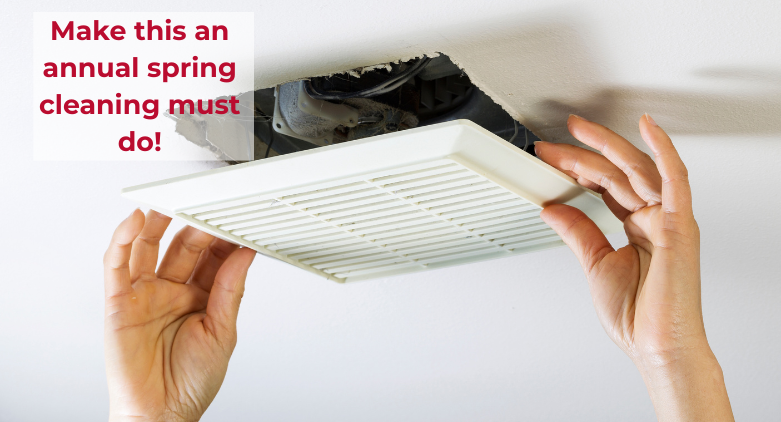
2. Creating a Fire-Safe Kitchen Through Cleaning:
The kitchen is a hub of activity, and unfortunately, a common source of house fires. A thorough spring cleaning in this area can significantly reduce risks.
- Degrease for Safety: Grease buildup on your stovetop, backsplash, microwave interior, and especially around the exhaust hood is highly flammable. Use a powerful degreaser to eliminate this hazard. Don’t forget to clean or replace your range hood filter, as it traps grease that can ignite.
- Clear the Burner Zone: Keep the area around your stovetop completely clear of flammable items like dish towels, paper towels, oven mitts, and wooden utensils. Store these safely away from heat sources.

3. Dust Off Your First Line of Defense: Smoke & Carbon Monoxide Detectors:
While not a traditional “cleaning” task, spring is the perfect reminder to give your smoke and carbon monoxide detectors some crucial attention. Dust buildup can impede their ability to detect smoke or gas effectively.
- The Simple Safety Step: Gently dust the exterior of each detector with a soft cloth. More importantly, test them! Press the test button to ensure the alarm sounds. If the batteries are old or the test fails, replace them immediately. Make it a habit to test monthly, but spring cleaning is an excellent time for a thorough check and battery refresh.
- 10-Year Rule:The National Fire Protection Association (NFPA) recommends replacing smoke alarms every 10 years from the date of manufacture.

4. Secure Your Entry Points: Windows and Doors:
As you open your windows to welcome the fresh spring air, take a moment to assess their security, along with your doors.
- Smooth Operation & Secure Locks: Check that all window and door locks operate smoothly. Lubricate any that are stiff or sticking. Repair or replace any locks that are damaged or not functioning correctly.
- Window Latches & Security: Ensure window latches engage firmly. Remember that window screens are for insects, not security. Always lock windows when they are closed, even if you’re just stepping away for a moment. For sliding doors, consider adding a security bar or foot lock for extra protection.
- Frame and Hinge Check: While cleaning frames, look for any signs of damage or rot that could compromise security. Ensure door hinges are securely fastened and show no signs of weakness.

By incorporating these essential cleaning and maintenance tasks into your spring cleaning routine, you’re not just tidying up; you’re actively enhancing the safety and security of your Suwanee home. A clean home is a safer home, and taking these steps can provide greater peace of mind for you and your family.
If you have any questions about home security or want to learn more about how EMC Security can further protect your home, please don’t hesitate to contact us! Let’s make this spring a safe and secure one with fire prevention in mind.
Call us today at 770-963-0305 or >>CLICK HERE<< to schedule a call.
-
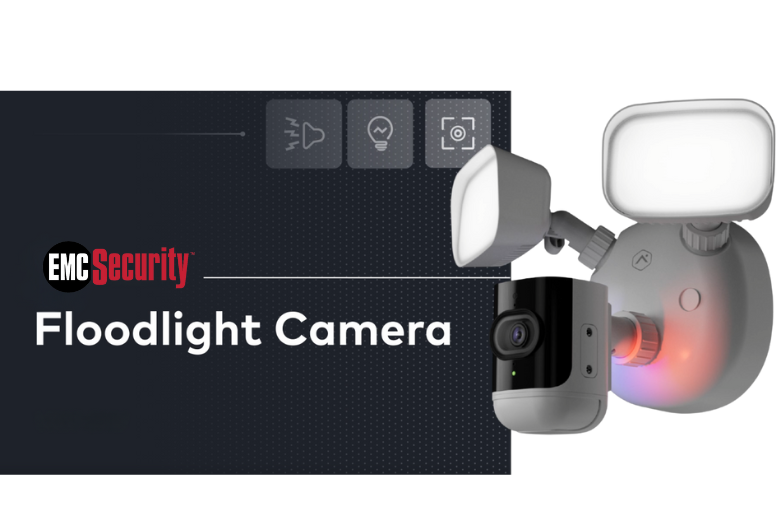
Light Up Your Security: Meet EMC Security’s new Floodlight Camera!
You asked, and we listened! We’re excited to announce the arrival of our latest innovation in home and business security: a cutting-edge floodlight camera designed to deliver unparalleled visibility and proactive protection. If you’re looking to enhance your property’s security and gain greater peace of mind, read on to discover the impressive features of this new addition to our security solutions.
Illuminate and Observe with Unmatched Clarity
Imagine a security solution that not only keeps a watchful eye on your property but also floods potential blind spots with powerful light. Our new floodlight camera boasts a brilliant 3,000 Lumen floodlight with a 4000K Cool White color temperature. This ensures that any activity in the illuminated area is captured in crisp, clear detail by the integrated 4MP high-definition camera. Say goodbye to grainy nighttime footage and hello to exceptional property awareness.
More Than Just Illumination: Active Deterrence at Your Fingertips
This isn’t just a camera with a bright light – it’s a proactive security tool. The floodlight camera features customizable warning lights that can strobe in red and blue, instantly drawing attention and deterring potential intruders upon detection. Furthermore, a built-in powerful speaker enables two-way audio, allowing you to communicate directly with anyone on your property through our intuitive app. Whether you need to instruct a delivery driver or confront a suspicious individual, you have the power to engage in real-time.
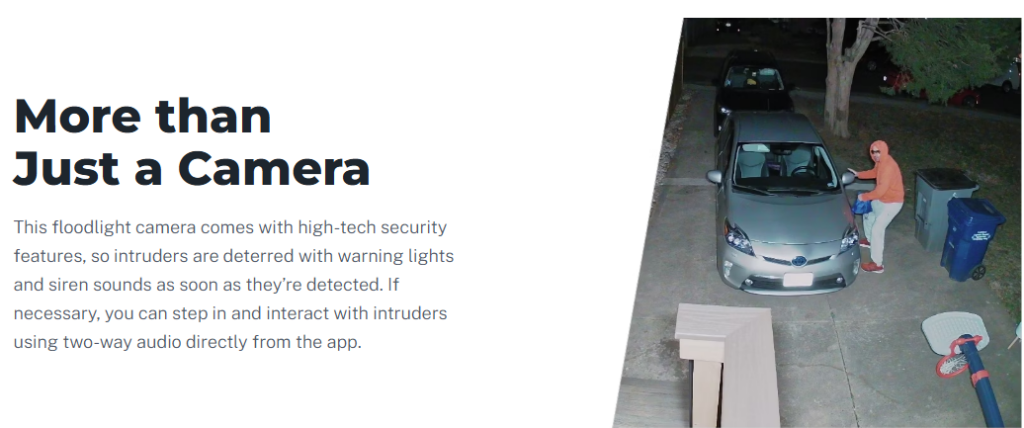
Your Security, Your Rules: Customizable Defense
We understand that every property and security need is unique. That’s why our floodlight camera offers a wide array of customizable lighting options and triggers. You can set the lights to activate based on:
- Motion detection: Triggered by movement within a defined area.
- Video analytics: Leveraging intelligent algorithms to differentiate between people, animals, and vehicles, minimizing false alarms.
- Schedules: Set specific times for the floodlights to turn on or off.
Explore six dynamic lighting modes, including a constant full flood, attention-grabbing strobe, and distinctive red/blue patterns to suit your specific security strategy.
Flexible Installation for Optimal Coverage
Designed with versatility in mind, both the camera and the strobe lights are rotatable, providing you with multiple mounting options. Install it vertically on a wall or horizontally under an eave or porch – the choice is yours.
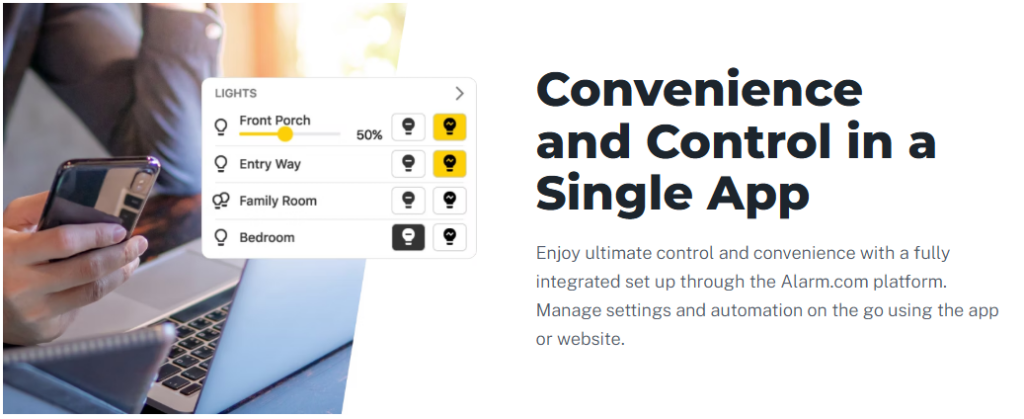
Backed by Our Commitment to You
Just like all our security solutions, this new floodlight camera is backed by our unwavering commitment to your satisfaction. You can count on us for ongoing support, prompt answers to your questions, and reliable in-home technical assistance to ensure your security system operates flawlessly.
Ready to Make Your Property More Secure?
Want to find out more about our new Floodlight Camera? Call us today at 770-963-0305 or CLICK HERE to request a call.
-
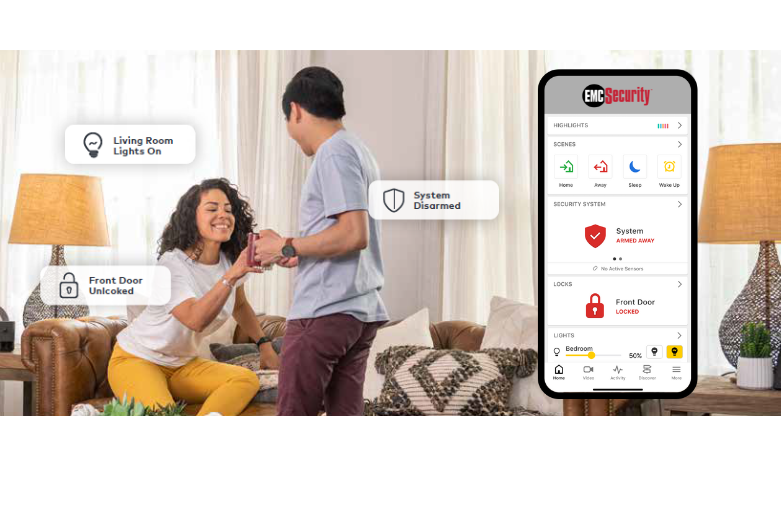
Unlock a Smarter, Safer Home with Smart Home Automation
In today’s fast-paced world, convenience and security are paramount for homeowners in the vibrant Metro Atlanta area. Imagine having complete control over your home’s essential functions right in the palm of your hand. With the power of your smart phone and smart home automation, this isn’t just a futuristic fantasy – it’s a reality that can significantly enhance your comfort, efficiency, and, most importantly, your peace of mind right here in our community.
At EMC Security, a leading security company serving the communities of Metro Atlanta and Metro Greenville, SC, we understand the importance of feeling secure, whether you’re at home or miles away. That’s why we’re excited to highlight the incredible capabilities of smart home automation, all accessible through a user-friendly app on your smartphone.
Your Smartphone: The Ultimate Smart Home Control Center for Atlanta Homeowners
Think of your smartphone as your personal home command center. Through our intuitive app, you can seamlessly manage various aspects of your home including:
- Smart Thermostats: Adjust your home’s temperature from anywhere. Cool your house down on your way home from work, or adjust if you forgot before leaving your residence. Enjoy energy savings and optimal comfort with just a few taps, perfect for our climate.
- Smart Lighting: Take control of your home’s lighting from the convenience of your smartphone, no matter where you are . Our smart lighting features go beyond simple on/off control. Imagine being able to schedule your indoor lamps and outdoor lights to turn on and off at specific times, creating the illusion that someone is home even when you’re out of town. This is a powerful deterrent against potential intruders, adding an extra layer of security. You can easily adjust these schedules remotely, ensuring your home always looks occupied when you need it to.
- Smart Locks: Secure your doors at your home with keyless entry. Lock or unlock your doors remotely, providing convenient access for family members or trusted visitors. No more fumbling for keys or worrying about lost ones for residents here! Can’t remember if you locked your door? Just check the app and take action.
The Magic of Automated Scenes for Your Lifestyle
The true power of smart home automation lies in its ability to create customized “scenes.” These pre-programmed settings allow multiple devices to work together seamlessly based on specific triggers or times, perfectly adapting to your routine in the Atlanta area. For example:
- “Leaving Home” Scene: Imagine this: as you lock your smart door at a designated time, your system can automatically adjust the thermostat and arm your security system – all without you lifting a finger!
- “Good Morning” Scene: Wake up to a comfortable home with the thermostat adjusting to your preferred temperature and lights gradually turning on, making those mornings even better.
Enhanced Security and Convenience for Remote Access
One of the most significant advantages of our smartphone-controlled security system is the unparalleled convenience and security it offers when you’re away from your home.
- Remote Disarming and Unlocking: Have a friend or family member needing to check on your plants or pets while you’re out of town? Our app allows you to disarm your security system and unlock the door remotely. Once they’ve finished, you can easily lock up and re-arm the system – all from your smartphone.
- No More Sharing Codes: This feature eliminates the need to share your security system codes, enhancing your home’s security and ensuring that only authorized individuals have access during specific times. A crucial safety feature for families in our community.
Peace of Mind in Your Pocket
Smart home automation isn’t just about convenience; it’s about providing you with greater control and peace of mind. Knowing you can monitor and manage your home’s security and essential functions from anywhere in the world offers invaluable reassurance to residents here.
Ready to Experience the Smarter, Safer Way to Live?
At EMC Security, we’re committed to providing you with cutting-edge security solutions that integrate seamlessly with your modern lifestyle in the Metro Atlanta and Greenville region. Contact our team of security experts serving our local community today to learn more about how our smartphone-controlled security systems and smart home automation features can transform your home into a safer, more convenient, and smarter living space.
Call us at 770-963-0305 or CLICK HERE to schedule a consultation.
-

Apartment & Townhome Safety Checklist
- Access Control: Understand how the key fob or code system works for entry and exit. Test it a few times to ensure it functions properly.
- Security Cameras: Note the locations of any security cameras in the building and surrounding areas.
- Intercom System: Learn how to use the intercom to grant access to visitors.
- Emergency Exits: Locate all emergency exits and familiarize yourself with the building’s evacuation plan.
- Building Staff: Get to know the names and contact information of the building manager and security personnel.
- Door Reinforcement: While you can’t change the locks, consider adding a door reinforcement device like a door jammer or security bar for extra protection.
- Window Locks: Install additional window locks, especially on lower floors.
- Sliding Door Security: Add a security bar or a dowel in the track of sliding doors to prevent them from being forced open. Thats a common step in Apartment and Townhome Security.
- Smoke and Carbon Monoxide Detectors: Test the smoke and carbon monoxide detectors in your unit and note their locations. Inform management if they are not working properly.
- Fire Extinguisher: Purchase a small fire extinguisher and keep it easily accessible in the kitchen. Learn how to use it properly.
- Escape Plan: Create a fire escape plan with your roommates or family members and practice it regularly.
- Emergency Contacts: Post a list of emergency contacts (fire, police, poison control) in a visible location and save them in your phone.
- Neighborhood Watch: Participate in any neighborhood watch programs in your area.
- Stranger Danger: Don’t open your door to strangers. Use the intercom or peephole to identify visitors.
- Valuables: Keep valuables out of sight and consider investing in a small safe.
- Consider an EMC Security DIY security system to protect your place and what’s inside.
- Features: Consider the features that are most important to you, such as video recording, motion detection, or remote access.
- Ease of Installation: Look for systems that are easy to install and don’t require drilling or wiring.
- Compatibility: Ensure that the system is compatible with your smartphone and other smart home devices.
- Set up security cameras: Install cameras in strategic locations around your property. Review footage regularly to monitor for any suspicious activity. EMC Security can help you choose the right cameras for your needs.
- Wireless Indoor Cameras: These cameras are easy to set up and can be placed on shelves or tables. They offer live video feeds, motion detection, and recording capabilities.
- Doorbell Cameras: Doorbell cameras replace your existing doorbell and allow you to see and talk to visitors through your smartphone. They also record footage when motion is detected.
- Renters Insurance: While many properties require it, if optional, obtain renters insurance to protect your belongings from theft, fire, or other damages.
- Outdoor Spaces: If you have a balcony or patio, make sure it’s well-lit and consider adding motion-sensor lights.
- Home Inventory: Create a home inventory with photos or videos, including serial numbers, to help with insurance claims.
- Light Timers: Use light timers to give the appearance that someone is home when you’re away.
Ensuring the safety and security of your apartment or townhome is an ongoing process. This checklist will help you identify and address potential hazards that should be addressed:
Additional Precautions:
Security System and Cameras
Personal Safety:
Fire Safety:
Secure Your Unit:
Familiarize Yourself with Building Security:
Home safety is an ongoing process. Regularly check your home’s safety features and make updates as needed. Call 770-963-0305 to learn more about Apartment and Townhome Security solutions.


